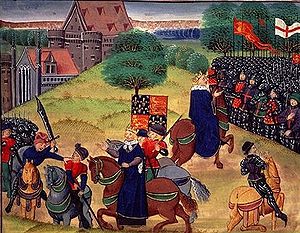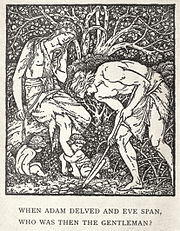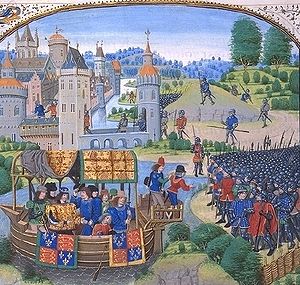
Peasants' Revolt
About this schools Wikipedia selection
SOS Children offer a complete download of this selection for schools for use on schools intranets. With SOS Children you can choose to sponsor children in over a hundred countries
The Peasants' Revolt, Tyler’s Rebellion, or the Great Rising of 1381 was one of a number of popular revolts in late medieval Europe and is a major event in the history of England. The names of some of its leaders, John Ball, Wat Tyler and Jack Straw, are still familiar even though very little is actually known about these individuals.
Tyler's Rebellion is significant because it marked the beginning of the end of serfdom in medieval England. Tyler's Rebellion led to calls for the reform of feudalism in England and an increase in rights for the serf class.
Events leading to the revolt
The revolt was precipitated by heavy-handed attempts to enforce the third poll tax, first levied in 1377 supposedly to finance military campaigns overseas — a continuation of the Hundred Years' War initiated by King Edward III of England. The third poll tax, unlike the two earlier, was not levied on a flat rate basis (as in 1377) nor according to schedule (as in 1379), but in a manner that appeared more arbitrary and hence unfair: it was also set at 3 Groat compared with the 1377 rate of 1 groat. The young King, Richard II, was also another reason for the uprising, as he was only 14 at the time, and therefore unpopular men such as John of Gaunt (the acting regent), Simon Sudbury (Chancellor and Archbishop of Canterbury) and Sir Robert Hales (the Lord Treasurer, responsible for the poll tax) were left to rule instead, and many saw them as corrupt officials, trying to exploit the weakness of the King. A longer-term factor was the way the Statute of Labourers of 1351 was enforced. The Black Death that ravaged England in 1348 and 1349 had greatly reduced the labour force, and, as a consequence, labourers were able to demand enhanced terms and conditions. The Statute attempted to curb this by pegging wages and restricting the mobility of labour, but the probable effect was that labourers employed by lords were effectively exempted, but labourers working for other employers, both artisans and more substantial peasants, were liable to be fined or held in the stocks.
Incidents in the Essex villages of Fobbing and Brentwood triggered the uprising. On 30th May, John Brampton attempted to collect the poll tax from villagers at Fobbing. The villagers, led by Thomas Baker, a local landowner, told Brampton that they would give him nothing and he was forced to leave the village empty handed. Robert Belknap (Chief Justice of Common Pleas) was sent to investigate the incident and to punish the offenders. On 2nd June, he was attacked at Brentwood. By this time the violent discontent had spread, and the counties of Essex and Kent were in full revolt. Soon people moved on London in an armed uprising.
First protests
In June 1381, two groups of common people from the southeastern counties of Kent and Essex marched on London. The most vociferous of their leaders, Walter, or "Wat" Tyler, was at the head of a contingent from Kent. When the rebels arrived in Blackheath on June 12, the renegade Lollard priest, John Ball, preached a sermon including the famous question that has echoed down the centuries: "When Adam delved and Eve span, who was then the gentleman?". (I.e. "when Adam dug, and Eve spun, were there then any nobility?") The following day, the rebels, encouraged by the sermon, crossed London Bridge into the heart of the city. Meanwhile the 'Men of Essex' had gathered with Jack Straw at Great Baddow and had marched on London, arriving at Stepney. Instead of what was expected from a riot however, there was only a systematic attack on certain properties, many of them associated with John of Gaunt and/or the Hospitaller Order. On June 14, they are reputed to have been met by the young king himself, and, led by Richard of Wallingford to have presented him with a series of demands, including the dismissal of some of his more unpopular ministers and the effective abolition of serfdom. One of the more intriguing demands of the peasants was "that there should be no law within the realm save the law of Winchester". This is often said to refer to the statutes of the Charter of Winchester (1251), though it is sometimes considered to be a reference to the more equitable days of king Alfred the Great, when Winchester was the capital of England.
Storming the Tower of London
At the same time, a group of rebels stormed the Tower of London— probably after being let in— and summarily executed those hiding there, including the Lord Chancellor ( Simon of Sudbury, the Archbishop of Canterbury, who was particularly associated with the poll tax), and the Lord Treasurer ( Robert de Hales, the Grand Prior of the Knights Hospitallers of England). The Savoy Palace of the king's uncle John of Gaunt was one of the London buildings destroyed by the rioters. Richard II agreed to reforms such as fair rents and the abolition of serfdom.
Smithfield
At Smithfield, on the following day, further negotiations with the king were arranged, but on this occasion the meeting did not go according to plan. Wat Tyler left his army and rode forth to parlay with the King and his party. Tyler, it is alleged by the chroniclers, behaved most belligerently and dismounted his horse and called for a drink most rudely. In the ensuing dispute, Tyler drew his dagger and William Walworth, the Mayor of London, drew his sword and attacked Tyler, mortally wounding him in the neck and Sir Ralph de Standish, one of the King's squires, drew his sword and ran it through Tyler's stomach killing him almost instantly. Seeing him surrounded by the King's entourage, the rebel army was in uproar, but King Richard, seizing the opportunity,rode forth and shouted "You shall have no captain but me.", a statement left deliberately ambiguous to defuse the situation. He promised the rebels that all was well, that Tyler had been knighted, and their demands would be met - they were to march to St John's Fields, where Wat Tyler would meet them. This they duly did, but the King broke his promise. The nobles quickly re-established their control with the help of a hastily organised militia of 7000, and most of the other leaders were pursued, captured and executed, including John Ball. Jack Straw turned on his associates under torture and betrayed many of them to the executioner - though it did not save him. Following the collapse of the revolt, the king's concessions were quickly revoked, and the tax was re-levied.
Despite its name, participation in the Peasants' Revolt was not confined to serfs or even to the lower classes. Although the most significant events took place in the capital, there were violent encounters throughout eastern England -- but those involved hastened to dissociate themselves in the months that followed.
The Cutty Wren
The Cutty Wren, one of the earliest known protest songs, dates from the time of the revolt. It tells the story of the capture of the wren - a symbol for the King (or perhaps for England itself) - and its division amongst the poor people. A version of the song appeared on Chumbawamba's English Rebel Songs 1381-1984.
Literary mention
John Gower, friend of Geoffrey Chaucer, saw the peasants as unjustified in their cause. In his Vox Clamantis, he sees the peasant action as the work of the Anti-Christ and a sign of evil prevailing over virtue, writing "....according to their foolish ideas there would be no lords, but only kings and peasants...".
Geoffrey Chaucer mentions Jack Straw, one of the leaders of the Revolt, in his satiric 'The Nun's Priest's Tale' of The Canterbury Tales.
Froissart's Chronicles devotes twenty pages to the revolt.
William Morris described the revolt in A Dream of John Ball (1888)



